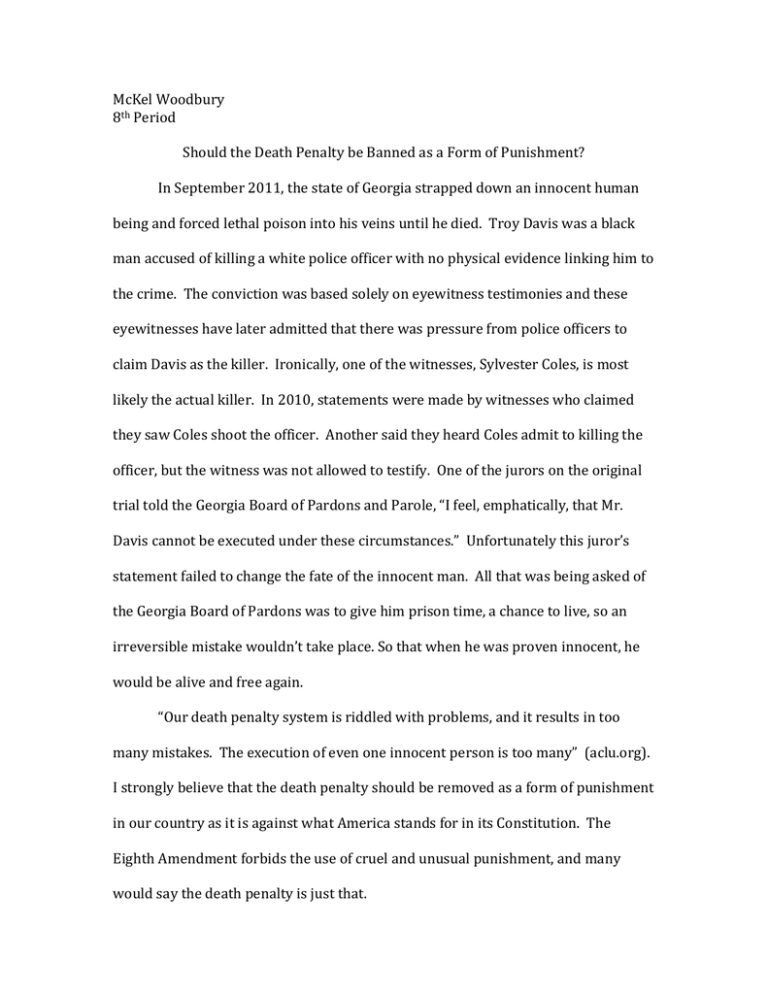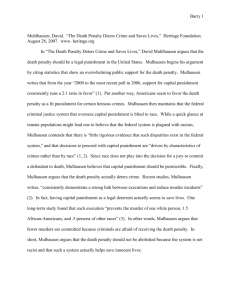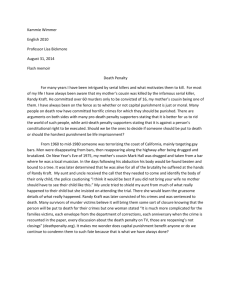arg essay dp
advertisement

McKel Woodbury 8th Period Should the Death Penalty be Banned as a Form of Punishment? In September 2011, the state of Georgia strapped down an innocent human being and forced lethal poison into his veins until he died. Troy Davis was a black man accused of killing a white police officer with no physical evidence linking him to the crime. The conviction was based solely on eyewitness testimonies and these eyewitnesses have later admitted that there was pressure from police officers to claim Davis as the killer. Ironically, one of the witnesses, Sylvester Coles, is most likely the actual killer. In 2010, statements were made by witnesses who claimed they saw Coles shoot the officer. Another said they heard Coles admit to killing the officer, but the witness was not allowed to testify. One of the jurors on the original trial told the Georgia Board of Pardons and Parole, “I feel, emphatically, that Mr. Davis cannot be executed under these circumstances.” Unfortunately this juror’s statement failed to change the fate of the innocent man. All that was being asked of the Georgia Board of Pardons was to give him prison time, a chance to live, so an irreversible mistake wouldn’t take place. So that when he was proven innocent, he would be alive and free again. “Our death penalty system is riddled with problems, and it results in too many mistakes. The execution of even one innocent person is too many” (aclu.org). I strongly believe that the death penalty should be removed as a form of punishment in our country as it is against what America stands for in its Constitution. The Eighth Amendment forbids the use of cruel and unusual punishment, and many would say the death penalty is just that. The death penalty has been enforced for hundreds of years; the first written account being in the Code of Hammurabi, an ancient Babylonian document. Under the code, written in the 1700s B.C., twenty-five crimes were punishable by death. These crimes included adultery (cheating on a wife or husband) and helping slaves escape. Murder was not one of the twenty five crimes” (Guersney, JoAnn). It is interesting that thousands of years ago so many crimes were punishable by death but murder was not. Today in the United States, the only offenses that could yield the death penalty are murder and capital offenses. Earlier in the history of the United States, many more crimes were punishable by death such as robbery, horse theft, rape, slave rebellions, counterfeiting, and arson. After the American Revolution, our nation’s leaders heavily revised what offenses would receive the death penalty. The time and money spent on utilizing the death penalty is simply not worth it. Surprisingly, it costs more money to put someone to death than it does to put someone in prison for a lifetime. “Cases receiving a death notice are approximately $517,000 more costly during the trial phase, $147,000 more costly during the penalty phase, and $201,000 more costly during the appellate phase than a capital eligible case where no death notice was filed…. On average, a death notice adds about $1,000,000 in costs over the duration of a case" (Roman, John). There are currently more than 3,000 inmates in the United States on death row. Imagine how much money would be saved for all taxpaying Americans if these inmates on death row were put in jail for life without parole instead. This money could be used for worthwhile causes beneficial to our communities. “The millions of dollars in savings could be spent on education, roads, police officers and public safety programs, afterschool programs, drug and alcohol treatment, child abuse prevention programs, mental health services, and services for crime victims and their families” (Messerli, Joe). Very extensive work and proceedings are required in order for a death sentence to be executed. When it is decided that it will be a death penalty case, everything gets more expensive and time consuming. “All the appeals, motions, hearings, briefs, etc. monopolize much of the time of judges, employees, and attorneys as well as use up courtrooms and facilities. This is time and space that could be used for other unresolved matters. The court system is tremendously backed up.” (balancedpolitics.org) Going along with this statement, jury members may be hesitant to convict someone as guilty if they know the person will be put to death. Most people do not like the idea of having someone’s life in their hands. The death penalty combines the most expensive and time consuming parts of a case. There is no actual evidence that proves that the death penalty is a deterrent for potential criminals and murderers. Just because there is a death penalty punishment set in place in a particular state doesn’t mean it’s going to make a large impact on the murder rates. It has been proven that states that have banned the death penalty have no significant improvement on their crime and murder rates. When someone decides to kill another person, they aren’t thinking of the repercussions of their actions. "There is no credible evidence that the death penalty deters crime more effectively than long terms of imprisonment. States that have death penalty laws do not have lower crime rates or murder rates than states without such laws. And states that have abolished capital punishment show no significant changes in either crime or murder rates. The death penalty has no deterrent effect. Claims that each execution deters a certain number of murders have been thoroughly discredited by social science research" (aclu.org). Subsequently, there is no point to have a death penalty set in place at all. The United States remains as one of the few countries that still utilizes the death penalty as a form of punishment. “Only 10 percent of countries in the world, 20 out of 198, carried out executions last year” (amnesty.org). Why are we making ourselves the minority? It is clear from that statistic that America is one of the few nations that still carry on this barbaric punishment. "Ultimately, the moral question surrounding capital punishment in America has less to do with whether those convicted of violent crime deserve to die than with whether state and federal governments deserve to kill those whom it has imprisoned” (Stevenson, Bryan). To kill someone who has killed someone else is simply a vengeful act. It might seem understandable, but it is not rational. This endless cycle of violence will never let our nation grow and prosper because we will never be building up our nation to be better citizens. In addition, life in prison could be viewed as more of a punishment than death. When you’re in prison, you have the rest of your life to live with regret and guilt in a cell with other criminals and murderers. You have no freedoms and you can’t live your life anymore. Life in prison without parole is sometimes referred to as “death by incarceration” because prisoners will eventually die in prison. “Offenders sentenced to death by incarceration suffer a “civil death.” Their freedom—the essential feature of our civil society—has come to a permanent end. These prisoners are physically alive, of course, but they live only in prison. It might be better to say they “exist” in prison, as prison life is but a pale shadow of life in the free world” (Johnson, Robert). Their lives are confined to the pointless, demeaning, and dangerous world of prison. If a person is given the death penalty, their life is instantly over and there is no guilt they have to live with anymore. The death penalty is not fair to all Americans; it is very biased and is mostly dealt with by the poor citizens of our nation. These people with low incomes don’t have enough money to hire good attorneys to support them and prove their innocence. "Who pays the ultimate penalty for crimes? The poor. Who gets the death penalty? The poor. After all the rhetoric that goes on in legislative assemblies, in the end, when the net is cast out, it is the poor who are selected to die in this country. And why do poor people get the death penalty? It has everything to do with the kind of defense they get. Money gets you good defense. That's why you'll never see an O.J. Simpson on death row. As the saying goes: 'Capital punishment means them without the capital get the punishment'" (Prejean, Helen). You are better off rich and guilty than poor and innocent. Mentally ill people proven guilty may be put to death. In the Supreme Court case Atkins vs. Virginia (2002), “the Supreme Court determined that executing mentally retarded criminals violates the ban on "cruel and unusual punishments" because their mental handicap lessens the severity of the crime and therefore renders the extraordinary penalty of death as disproportionately severe” (law.cornell.edu). People that aren’t in their right state of mind should not have to be punished for something they can not control. These people are born with defects in their brain and no amount of schooling, medicine, or rehabilitation will change their mental state. The main argument most people have when defending the death penalty is that it keeps the criminal or murderer from ever committing that crime again. It “keeps the criminals off the streets for good.” However, by putting them in prison for a lifetime, with no possibility of parole, the same outcome is achieved. The criminal in either case is not interacting with society and given the opportunity to commit heinous crimes again. How often do you hear of a prisoner actually escaping from jail? This hardly ever happens. The only way they can get out is if the parole board releases them. The simple solution is to sentence the person to a lifetime in prison without the possibility of parole, thereby taking that argument out of the debate. Proponents for the death penalty also argue that it gives closure to the victim’s family that has suffered so much; as if somehow seeing the criminal’s family suffer because of the death of their loved one would make them feel any better. The fact is the victim is not going to come back to life. There is no reason to kill yet another person and make their family feel the same sorrow. Another argument that proponents of the death penalty might give is that in this day and age DNA evidence and forensic science can eliminate all doubt as to a person’s innocence or guilt. This may be true in most cases; however in some instances police and interrogators will use very aggressive methods to get a confession so the suspect feels like the only way out is to admit guilt. Once a confession is made, there is no recanting the statement. Confessions have huge weight in the justice system, and some prosecutors will claim that a confession trumps DNA evidence to the contrary. It even could be the case that years after an execution DNA evidence is brought to light proving the suspect innocent. Someone having to lose their life over a false confession they felt they had to make should not be acceptable in our country’s justice system. Whether by lethal injection, death by firing squad, or electrocution, it makes no difference; one method is not more humane than the other. It is still taking a life and that is wrong. It should seem obvious that killing someone who killed someone else is simply doing to them what they did to someone else. You’re using murder to punish someone for committing a murder. The same can be said about a mother who punishes her child for hitting his sister by hitting him. It just makes no sense. Fortunately, the use of the death penalty as a form of punishment has begun to decrease over the past few years. It has become more obvious that choosing to put criminals in jail for life without parole makes much more sense. “The use of the death penalty—both in number of new death sentences and actual executions—has been steadily decreasing during the past decade. Two phenomena largely explain this decrease: (1) the continued discovery of individuals on death row who are actually innocent of the crimes they allegedly committed, and (2) the increasing use of life without parole as a sentencing alternative to the death penalty” (Berry, William). I believe the death penalty should definitely not be used as a form of punishment. All in all, it comes down to whether we should keep a system for the sake of retribution and revenge even though it isn’t effective in reducing violent crime, costs much more than life in prison, and worst of all, can lead to the nightmare of finding that we executed someone for a crime he didn’t commit. Works Cited Berry, William W. “Ending Death by Dangerousness: A Path to the De Facto Abolition of the Death Penalty.” Arizona Law Review 52.4 (2010): 889-924. Legal Collection. 9 October 2012. “Capital Punishment.” Aclu.org. American Civil Liberties Union. Web. 9 October 2012. “Death Penalty.” Law.cornell.edu. Cornell University Law School, 19 August 2010. Web. 9 October 2012. “Death Penalty 2011: Alarming Levels of Executions in the Few Countries That Kill.” Amnesty.org. Amnesty International, 27 March 2012. Web. 9 October 2012. Guernsey, JoAnn B. “History of the Death Penalty.” Deathpenalty.procon.org. ProCon, 8 May 2012. Web. 9 October 2012. “The High Cost of the Death Penalty.” Deathpenalty.org. Web. 9 October 2012. Johnson, Robert. “Life Without Parole, America’s Other Death Penalty.” The Prison Journal 88.2 (2008): 328-329. Sage Publications. Web. 9 October 2012. Messerli, Joe. “Should the death penalty be banned as a form of punishment?” balancedpolitics.org. Web. 9 October 2012. Prejean, Helen. “Would Jesus Pull the Switch?” deathpenalty.procon.org. ProCon, 8 May 2012. Web. 9 October 2012. Roman, John. “Should the death penalty be allowed?” deathpenalty.procon.org. ProCon, 8 May 2012. Web. 9 October 2012. Stevenson, Bryan. “Close to Death: Reflections on Race and Capital Punishment in America.” Deathpenalty.procon.org. ProCon, 8 May 2012. Web. 9 October 2012.








